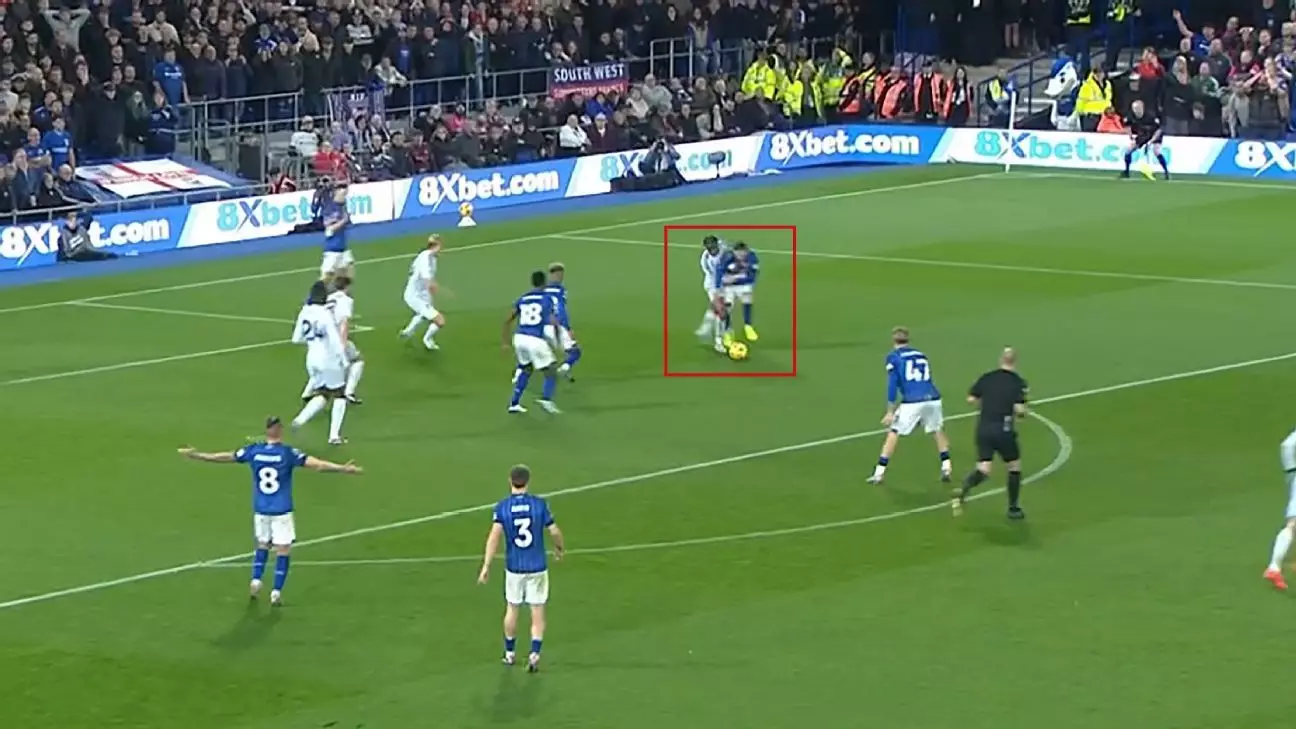Ipswich Town’s chairman, Mark Ashton, recently found himself at the center of a heated conversation regarding the controversial video assistant referee (VAR) system. Following a contentious moment during a Premier League match against Leicester City, Ashton’s impassioned declaration of “injustice” resonated with fans, players, and analysts alike. The referee’s decisions—or lack thereof—have underscored the ongoing debates surrounding VAR’s implementation, leaving many skeptical of its effectiveness in ensuring fair play in football.
During the match, Ipswich was holding a 1-0 lead when a pivotal incident unfolded in the 77th minute. A seemingly clear foul on Ipswich’s Conor Chaplin by Leicester’s Fatawu Issahaku resulted in chaos on the pitch. With the referee, Tim Robinson, opting to not award a penalty, the play continued, ultimately leading to a further incident where Kalvin Phillips fouled Ricardo Pereira, causing him to receive a second yellow card. The lack of VAR intervention in this moment raised eyebrows and ignited discussions about the reliability of the system designed to assist officiating.
Ashton’s frustrations were not merely a reaction to one game; they reflect a pattern that Ipswich Town has experienced since the season began. Conceding that they faced three VAR controversies, all unfavorable, has fueled deeper concerns about impartiality in the system.
Ashton’s Emotional Response: Defending the Club
In a candid message to BBC Suffolk, Ashton lamented the situation, revealing the depth of his passion for Ipswich Town. He called the situation on Saturday a “real injustice” and emphasized his dedication to defending the club. From his perspective, the decision-making regarding VAR does not align with the principles of fairness that he believes should govern football. His choice to message Howard Webb, a senior referee officer, before the game underscored his anticipation of trouble, indicating this was not the first instance of concern.
Ashton’s willingness to approach Webb directly highlights a unique aspect of football management: the pressure to advocate for one’s club while navigating the complexities of officiating and governance. His forthcoming attitude reflects the frustration many in the football community feel regarding inconsistent officiating, particularly in light of a supposed support for VAR.
One of the core grievances expressed by Ashton centers on the inconsistency surrounding VAR decisions. He noted that ambiguities are frequent, as some fouls are reviewed while others are overlooked entirely, leading to confusion among coaching staff and fans alike. These inconsistencies contribute to growing resentment against VAR, particularly when clubs like Ipswich perceive a lack of equal treatment compared to their larger counterparts.
The reference to a variance in penalties awarded during matches—where Ipswich sees decisions go against them while similar incidents for bigger clubs seem to attract referee intervention—only strengthens Ashton’s argument. This inconsistency not only undermines the teams involved but also dilutes the integrity of the league, as fans and pundits start to speculate on the potential biases that may exist within the officiating ranks.
Ashton’s sentiments reflect a broader dissatisfaction that permeates various clubs in the league. The notion that a revisit of the VAR structure could result in different voting outcomes now raises significant questions about its efficacy and its role moving forward. Despite Wolves’ failed attempt to eliminate VAR earlier this year—which crumbled under overwhelming opposition—Ashton’s dissent could signal a turning tide among club executives.
Ashton concluded with an appeal for clarity and fairness, emphasizing the vital need for responses that validate the experiences of players, management, and, most importantly, the fans. The survival of the clubs in the league hinges on equitable treatment, rendering VAR’s role increasingly scrutinized.
The ongoing debates surrounding how VAR operates and the responses from individuals like Mark Ashton illustrate the complex relationships involved in modern football, where technology’s intent to rectify human error paradoxically risks undermining the sport’s spirit. As Ipswich continues its campaign, the hope for a more consistent approach to officiating remains fervent, resonating as a collective plea from clubs who desire integrity in the beautiful game.
